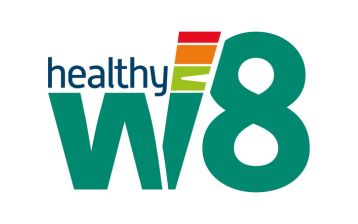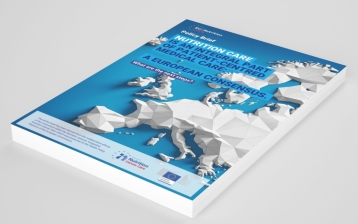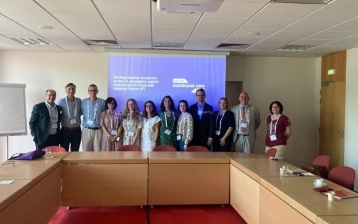
Joint Call to Action
To influence EU programmes and to support national initiatives, the European Nutrition for Health Alliance and its partners have developed a joint call to action with 7 actionable recommendations designed to ensure the protection of nutritional status in cancer in national health policies.
The call to action is a template that can be tailored to your country’s or region’s specific situation and needs. The European Nutrition for Health Alliance can also support the organisation of your policy seminar.

7 recommendations for the implementation of optimal nutritional cancer care at EU member state level
1.92 MB
Download
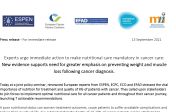
13 September 2021 - Experts urge immediate action to make nutritional care mandatory in cancer care
180.80 KB
Download
Watch the launching event on demand
Video URL: https://www.youtube.com/watch?v=TG91RxjjOVM
The right of patients to nutritional care in cancer treatment
Recognising the need for every member state to take coordinated actions for Europe’s Beating Cancer Plan implementation, this joint call to action includes 7 key recommendations designed to ensure the protection of the nutritional status of patients with cancer.
It is our position that high-quality care cannot be delivered without fully integrating nutritional care into the cancer care pathway, from diagnosis through the entire disease trajectory. We urge all EU member states and their respective institutes to incorporate these essential recommendations in national cancer strategies and all relevant national and local health and healthcare policies.
Background
Failure to protect nutritional status in cancer is undermining the quality of cancer care in Europe.
There is now overwhelming scientific evidence that a failure to prevent weight and muscle loss in patients with cancer may undermine the effectiveness of treatments and significantly increase the risk of serious side effects1,2,3,4. For those in whom cure is no longer possible, poor nutritional status impairs quality of life and reduces survival time 4,5,6,7,8. Yet malnutrition, despite being the single most frequent, serious complication in cancer continues to receive unacceptably low priority in national cancer care policies and patient services 9. This urgently needs to change.
Patients pay the price of nutritional care not taken seriously.
The low priority placed on nutritional care in cancer across Europe has undoubtedly had distressing consequences for some patients and their families, with inequities and gaps in care highlighted in a recent European survey of patients10. Not only do gaps in nutritional care expose cancer patients to increased risks of potentially avoidable complications and treatment side effects, but for some, the inability to access early nutritional care means that they have less time, or poorer quality time, to spend with loved ones 11,12,13, 14. It is important not to allow any further time to elapse.
Based on available research (1,14), it is estimated that 10 and 20% of the 1.3 m cancer deaths in the EU (2020) can be attributed to malnutrition, rather than cancer itself.
Call to Action: make optimal nutritional care a mandatory component of high-quality cancer care.
The European Nutrition for Health Alliance, on behalf of its member organisations, is calling for national governments across Europe to make nutritional care a mandatory and fully integrated component of high-quality care. Taking action to ensure early access of patients to proactive nutritional care has the potential to prevent treatment-limiting side effects, allowing more patients to benefit from advances in cancer treatments, whilst improving the quality of life and survival time for many others.
Europe’s Beating Cancer Plan commits to giving everyone with cancer the same access to high-quality care – which must include nutritional care.
The European Nutrition for Health Alliance and its partners, recognise Europe’s Beating Cancer Plan as a true game-changer to address inequities in the quality of cancer care across member states. With a €4.1billion budget aimed at supporting the implementation of this ambitious programme, national policymakers now have an unrivalled opportunity to align their cancer programmes with best international practice for high-quality care that carries the same hope of survival and quality of life. However, high-quality cancer care cannot be delivered without addressing the gaps in workforce training, clinical pathways and dietetic services that leave many patients without timely access to information, dietary counselling or nutrition support needed to achieve their best possible outcome.
7 Effective and actionable recommendations
① The right to high-quality cancer care and medicines must explicitly apply to optimal nutritional care.

Central to Europe’s Beating Cancer Plan is the commitment that everyone should have the same access to high-quality cancer care and medicines, with the same hope of survival. Since malnutrition is the single most common complication in cancer and adversely affects quality of life and survival, access to high-quality care carries the implicit right to appropriate nutritional care, including nutritional support. Member state authorities should make this right to optimal nutritional care explicit within their cancer strategies, ensuring systems and funding to allow access to required care and support.
② Measuring and monitoring nutritional and metabolic status should be systemised and reviewed as a standardised part of the multidisciplinary team (MDT) processes.

Quality assured treatments are a major focus of Europe’s Beating Cancer plan to reduce deaths from cancer and improve survivorship. As with cancer itself, early detection of nutritional issues is essential to preserving muscle mass and achieving best outcomes. Monitoring through nutrition screening programmes linked to care pathways should be mandatory for all cancer centres and treatment settings.
③ All multidisciplinary teams should include a specialist oncology dietitian.
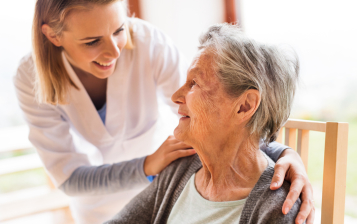
The MDT is recognised within Europe’s Beating Cancer plan as essential to high quality, patient-centred care and must include a specialist dietitian, given the high prevalence and impact of nutritional issues from diagnosis through to end of life. The integration of nutrition within the MDT should be mandated in member state implementation plans.
④ Development of a standardised framework for nutrition education and training, extended to all those involved in cancer care currently and in the future.

Europe’s Beating Cancer plan specifies the need for the multidisciplinary workforce to receive inter-speciality training on nutrition support. Nutrition training should be mandatory for all relevant professions of the multidisciplinary workforce and extended to undergraduate medical students, general practitioners and other healthcare professions allied to medicine. A curriculum should be developed with minimum standards for training on nutritional care, building on the work of the European Society for Clinical Nutrition and Metabolism (ESPEN) and affiliate partners, including the European Federation of the Associations of Dietitians (EFAD).
⑤ All member state authorities should establish a nutrition steering group linked to comprehensive cancer centres.

A framework should be developed to describe a clear directorate structure around good nutritional care in cancer, with oversight by a nutrition steering group for cancer. This multidisciplinary group, which can link into existing nutrition steering groups, should have responsibility for monitoring and auditing agreed key performance indicators. These, as a minimum, should include nutrition screening rates, inclusion of nutrition measures as part of multidisciplinary team process, incidence of malnutrition and metrics around dietetic service access, referral rates, waiting lists and evaluation of compliance with agreed guidelines.
⑥ Research funding should be allocated to identify effective implementation strategies for integrating optimal nutritional care into cancer care.

Integrating nutritional care into existing cancer care pathways requires local research projects to identify current policy, resource and care gaps and effective measures to address them. Europe’s Beating Cancer plan should allocate budget to initiatives aimed at identifying the most effective implementation strategies.
⑦ Cancer patients should have timely access to information and resources regarding nutrition, diet, and nutritional therapies relevant to their disease type and stage.

The 2017 survey by the European Cancer Patient Coalition (ECPC) highlighted significant gaps in nutritional care and information provided to patients across several countries in Europe. The European Commission plans to launch a new project to improve health literacy around cancer prevention and care. Resources for patients should be further developed to ensure access to information and advice around nutrition and diet, in collaboration with European patient organisations, including ECPC and the European Patients’ Forum (EPF), and at the member state level.
Rewatch EU4Nutrition LIVE
This policy seminar, held April 2021 under the Portuguese EU presidency, has identified concrete implementation recommendations at EU member state level and explores how patients and countries can benefit from Europe’s Beating Cancer plan.
Video URL: https://www.youtube.com/watch?v=K8Sqiqq9D48

